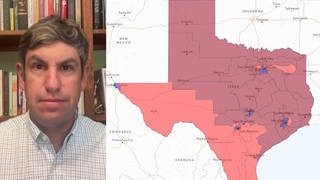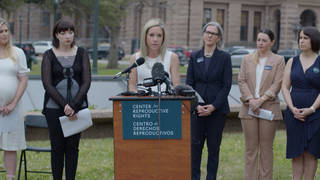
Guests
- Bhavik Kumarfamily medicine physician and abortion provider in Texas, co-chair of the Committee to Protect Health Care’s Reproductive Freedom Taskforce.
- Tamarra WiederKentucky state director for Planned Parenthood Alliance Advocates.
A Texas woman has had to flee to another state to have an emergency abortion after the state Supreme Court ruled against her. Kate Cox fled Monday after she had petitioned a judge to get an exemption from the state’s near-total abortion ban when her fetus was diagnosed with a fatal condition and doctors warned her carrying to term could endanger her fertility. “Unfortunately, it’s one of hundreds, if not thousands, of comparable stories,” says Dr. Bhavik Kumar, an abortion provider in Texas. “While these politicians say there are exceptions, somebody really has to be at death’s door before we can reasonably act in their favor.” We also speak with Tamarra Wieder, Kentucky state director for Planned Parenthood Alliance Advocates, who says the Texas case could have a “chilling effect” on people seeking abortions elsewhere in the country, including in Kentucky, where a pregnant woman is the lead plaintiff in a new class-action lawsuit that argues the state’s ban on abortion violates its constitution. “These laws, restrictions and attacks don’t happen in a vacuum,” says Wieder.
Transcript
AMY GOODMAN: This is Democracy Now!, democracynow.org, The War and Peace Report. I’m Amy Goodman.
We turn now to Texas. After a week in legal limbo, Kate Cox, a woman who sought a court ruling to temporarily block Texas’s abortion ban so she could get an emergency abortion, has left Texas to obtain the time-sensitive procedure she needs elsewhere. She is a mother of two who was 20 weeks pregnant when she sought the abortion after learning her fetus has a lethal abnormality and that being forced to carry the nonviable pregnancy to term could make it impossible for her to have more children.
A Texas judge granted a court order last Thursday in a landmark case that would have allowed her to have the abortion. But the next day, the Texas Supreme Court temporarily overturned the order. And then, on Monday, it issued a final ruling to stop Kate Cox from having an abortion. Texas Republican Attorney General Ken Paxton had filed the motion to overturn and threatened to prosecute any providers involved in giving Cox an abortion, from a doctor to a hospital.
Cox spoke to NBC News last Thursday.
KATE COX: It’s a hard time. We’re going through the loss of a child. There’s no outcome here that I take home my healthy baby girl, you know. So it’s hard, you know? Just grief.
AMY GOODMAN: The lawsuit filed by Kate Cox also sought protection for her husband and her doctor from the Texas law that allows anyone to sue patients, medical workers, a cab driver or even a patient’s family or friends who, quote, “aid and abet” an abortion.
Meanwhile, a pregnant woman in Kentucky is suing over her state’s near-total ban on abortion. She’s the lead plaintiff in the class-action lawsuit which argues the ban violates Kentucky’s Constitution. On Monday, her attorneys told a Kentucky court that after filing the case, the woman learned her embryo no longer has cardiac activity.
For more, we’re joined by two guests. In Kentucky, we’re joined by Tamarra Wieder, Kentucky state director for Planned Parenthood Alliance Advocates. And in Houston, Dr. Bhavik Kumar is with us, a family medical physician, abortion provider in Texas, also co-chair of the Committee to Protect Health Care’s Reproductive Freedom Taskforce.
We welcome you both to Democracy Now! Dr. Kumar, let’s begin with you in Texas. Explain the Kate Cox case, the abnormality her fetus had, what it meant for her, and how it’s possible the court went from saying, “Yes, you’re one of the exceptions to this abortion ban,” to having basically to flee the state of Texas so that she would not be — well, one of her great fears was sterile, so that she couldn’t have more children.
DR. BHAVIK KUMAR: [inaudible] case. It’s devastating to hear what Kate Cox has had to experience. And unfortunately, it’s one of hundreds, if not thousands, of comparable stories, where people know what’s best for them. They’re consulting their medical team, making decisions. But, unfortunately, in Texas, they’re unable to exercise that right.
From what I understand from public records, Kate Cox had a pregnancy that was diagnosed with trisomy 18, also referred to as Edwards’ syndrome, where it’s extremely likely that the pregnancy would not continue to term. Even if the pregnancy did continue to term, survival is very, very low. In public records, Kate also mentioned that she would like to have future children and preserve her fertility. And so, if this pregnancy were to continue, her health would be at stake, and her future fertility would also be in limbo and unclear. And so, the decision that she made with her medical team was to end this pregnancy. And I think we could clearly hear in her voice how difficult that decision might have been and how much emotion she’s feeling. And she sought that care here, close to home, in her home state of Texas.
And again, we see these stories all the time. This is a very common scenario. While Kate’s story is personal and unique to her, this is very, very similar to what I hear from hundreds of people. And before the fall of Roe, I would be able to help these folks, even if they are in a difficult moment, to at least get through it, to be able to live their lives on their own terms and to decide what’s best for their future. In this case with Kate, it might have been to have children at some other time and hopefully have a healthy pregnancy that she can carry to term.
So, luckily, Kate did have the ability to go out of state. That doesn’t mean it’s easy or, you know, nice for folks to go out of state. They should be able to get the care here in Texas. Many people, unfortunately, aren’t able to make it out of state. And in states like Texas and in Kentucky and in other states that have abortion bans, folks are being forced to carry those pregnancies to term, putting their lives at risk, their families’ lives at risk. And it’s a really unfortunate situation that we have here in Texas.
AMY GOODMAN: You see around the country, when politicians vote in abortion bans, they always say, “Oh, there are exceptions.” Now, there was an exception in Texas. Ultimately, the court ruled that she could have that procedure because of what was at stake for her. But then you have the attorney general of Texas, Ken Paxton, who himself they attempted to impeach, has been charged with corruption, and he blocked that. He sued, and the court agreed. And talk about what it means that a physician like you or a hospital or a cab driver driving a pregnant person somewhere could be sued by anyone in this country, if they were involved with them getting an abortion, sometimes to save their own lives.
DR. BHAVIK KUMAR: Yeah. This is exactly what we’ve been talking about for years now. We have a very hostile situation in Texas when it comes to reproductive rights, specifically abortion. And really anybody who’s at risk of becoming pregnant or is pregnant is under this hostile regime, and that includes the Texas attorney general. We have three abortion bans: one that was written in 1840s or 1850s, one that was passed after Roe fell, and then SB 8, which would allow anybody to bring a lawsuit forward, without knowing the person who had the abortion, up to three years after the abortion took place.
So, while these politicians say there are exceptions, somebody really has to be at death’s door before we can reasonably act in their favor. And here we have a situation where somebody has a nonviable pregnancy, their physician has looked at their specifics of their medical history and determined that this is best thing for them, sought some relief from the courts, a judge heard the case and said it’s OK for this to move forward, and yet the Texas attorney general is coming in with a letter threatening the physician, threatening anybody involved with that care, threatening all three hospitals where this physician has admitting privileges.
And the consequences are loss of medical license, monetary fines, civil and criminal liability, as well as potentially life in jail. So this is not something that we take lightly. While physicians like me want to provide care, we have the skills and training to provide care for these folks, we’re simply under a very oppressive regime that makes it unclear if we can act in our patient’s best favor, until they are sicker and closer to death, which is exactly what we, as physicians, want to avoid, while the state is pushing them further in that direction.
AMY GOODMAN: I want to bring Tamarra Wieder into the conversation, Kentucky state director for Planned Parenthood Alliance Advocates. If you can update us on what is happening with Jane Doe? On Monday, attorneys informed a Kentucky court that after filing a class-action lawsuit challenging the state’s abortion ban last Friday, the lead plaintiff, who we know now as Jane Doe, learned her embryo no longer has cardiac activity. What’s happening there in Kentucky?
TAMARRA WIEDER: Yeah. So, that is all that really is public knowledge at this point to protect Jane Doe’s identity. That has been key to this lawsuit moving forward. But at this time, nothing really changes the trajectory of this lawsuit moving forward, which is that we are going to move forward with Jane Doe at this moment, because it doesn’t change why we brought the suit forward.
She was pregnant in a state that did not allow her to terminate a pregnancy which she wanted to terminate. And she was going to have to leave the state to seek her abortion. Just like over a million other people of reproductive age in Kentucky right now who find themselves pregnant and seeking an abortion, they have to leave the state. Or just like in Texas if they have a medical emergency, they’re taken right up to the line of near death to access those medical exemptions, or so-called exemptions, because there is so much liability right now that hospitals are afraid to take on in the commonwealth. And so, people are having to leave the state and go either to Illinois or right now Ohio.
But there’s lots of new legislation that, you know, we are hearing from that are going to make it more difficult or increase the chilling effect. And what’s happening in Texas is definitely going to increase the chilling effect up here in Kentucky, because these laws, restrictions and these attacks don’t happen in a vacuum. But we will move forward with our lawsuit currently, with Planned Parenthood as a plaintiff, as well.
AMY GOODMAN: Jane Doe said in a press statement, “I am angry that now that I am pregnant and do not want to be, the government is interfering in my private matters and blocking me from having an abortion. I’m bringing this lawsuit because I firmly believe everyone should have the ability to make their own decisions about their pregnancies.” So you have a number of other people that are being represented here. And if you can talk about the politics of Kentucky? And do you see this ban being lifted?
TAMARRA WIEDER: Sure. So, we hope — it is a class-action lawsuit, so we do hope that people hearing about this case who may be in a similar situation in Kentucky, who would like to join our class-action lawsuit — they do have to be pregnant and seeking an abortion at the time that they join the class-action lawsuit — can call the ACLU of Kentucky or Planned Parenthood here in Kentucky, and we can talk with them and see if they can join the class-action lawsuit. We have been looking since February, when the Supreme Court of Kentucky informed us, with our previous lawsuit, that providers could not take our case forward without a patient. And so we had to start over and find a plaintiff, which has taken us some time. So, we are so incredibly proud and honored that Jane Doe stepped forward, especially, you know, in a politically hostile environment. I wouldn’t say that Kentucky is necessarily hostile. We have now had two elections where abortion has really been cemented as a winning issue in Kentucky. We had a constitutional amendment last year that overwhelmingly —
AMY GOODMAN: And you actually have —
TAMARRA WIEDER: — turned out Kentuckians.
AMY GOODMAN: As we wrap up, Democratic Kentucky Governor Andy Beshear is set for inauguration today. Many say his race turned on a referendum on abortion.
TAMARRA WIEDER: Correct, yes. Andy Beshear’s race really turned on abortion, really moved people to vote on abortion access, where our attorney general, Daniel Cameron, is one of the most restrictive attorney generals, similar to Ken Paxton, on abortion, and people turned out against him on abortion.
AMY GOODMAN: We have to leave it there, Tamarra. Tamarra Wieder, Kentucky state director for Planned Parenthood Alliance Advocates, wearing a pin that says “Bans off our bodies,” and Dr. Bhavik Kumar, family medicine physician and abortion provider in Texas.












Media Options